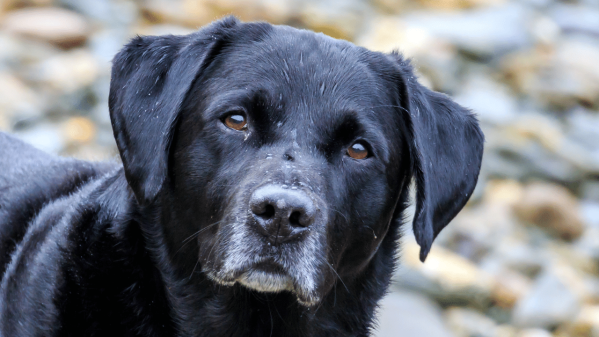As your pup starts to get older, you may notice they are acting in the same way our older human relatives act. They may seem more forgetful, or confused. Perhaps they don’t recognize their family members or have behavior changes. It’s hard not to be concerned, but how do we know what is a normal part of aging and what could be a sign of dementia in dogs?
We explore canine cognitive dysfunction: what it is, signs your dog may have dementia, as well as possible causes and treatments. As always, talk to a vet if you are unsure about your dog's health.
What is dementia in dogs?
Dementia in dogs is officially known by the term canine cognitive dysfunction. While this condition doesn’t necessarily impact life expectancy, it can cause symptoms that result in euthanasia to preserve quality of life.
Dog dementia, like human dementia, tends to occur in senior and geriatric dogs. “For many breeds, this is 10-12 years old, but giant breeds reach their senior years younger, and may have symptoms from 8 years old,” says Dr. Joanna Woodnutt MRCVS of LoveYourDog.com.
Signs your dog has dementia
There's an acronym that you can use to remember the signs of dog dementia: DISH stands for disorientation, interaction with family members, sleep, and housetraining.
There are specific signs to look for in each of these four categories. “With disorientation you may notice your dog pacing, seeming confused, forgetting where they are, ending up on the wrong side of a door, or getting stuck in corners,” says Suzy Gray BVetMed, Dip ACVIM and a guest contributor at Honest Paws.
Dogs may interact less with family members and respond less to verbal or visual commands. They may also stop seeking out interaction with members of the family.
Sleep disruption is often a sign that triggers the realization that something is wrong. “Dogs will often be less active during the day and sleep more but will sleep less at night, this can result in disrupted sleep for all the family,” says Dr. Gray.
As well as sleeping less at night dogs may also develop restlessness during night time hours. “Loss of housetraining and urination and defecation accidents in the house is also common in dogs as dementia progresses,” says Dr. Gray. Dogs may stop asking to be let out and may even have accidents in the house in front of the owners.
The symptoms of canine dementia include loss of smell, changes in sleep-wake pattern, pacing at night, anxiety, and repetitive behaviors. “My old spaniel would ask to be let out, then stand outside looking hurt that we’d put her out,” says Dr. Woodnutt. As soon as you let her back in, she’d do the same again. Similarly, Dr. Woodnutt shared she would appear to be drinking more – she’d have a drink, walk in a circle, and go back for a drink – as though she’d forgotten she’d already had water.
Dogs may also forget their housetraining or start fights with other animals in the home. “These symptoms can be very frustrating for dog owners, and affect the pet-owner bond,” says Dr. Woodnutt. If your previously lovely, loyal, well-trained dog is barking when you aren’t in the room, getting you up in the middle of the night, and urinating in the house, it can be really upsetting.
Dog dementia causes
The exact cause of dog dementia is still unknown, but there are a couple potential factors that can lead to the condition. First: “Most experts believe that canine dementia is just a result of normal deterioration of the brain due to the aging process,” says Amber LaRock, Licensed Vet Tech and Veterinary Consultant at catpet.club. Another potential cause is any underlying neurological condition, such as brain tumors or head trauma.
Life expectancy of dogs with dementia
Dementia slowly reduces the quality of life of your pet, which inadvertently diminishes their life expectancy. However the exact time frame is difficult to predict. “In such situations working in close consultation with your veterinarian is advised as he can advise when it's time to let go,” says Dr. Maureen Murithi DVM, the veterinary spokesperson for doggiedesigners.com.
If the dog is unable to perform tasks for daily living such as feeding, bathroom breaks (soiling on him/herself), inability to walk, etc, it's advised to have him/her put to sleep to avoid animal suffering.
Dog dementia treatments
The good news is, the symptoms of doggy dementia can be hugely helped with vitamins to boost brain power and a few lifestyle changes. “Look for a supplement or senior diet with medium-chain fatty acids, selenium, vitamins C and E, L-carnitine, and B-vitamins. SAM-e, which is usually a liver supplement, can also be of benefit to dogs with early cognitive decline,” says Dr. Woodnutt.
You should also try to keep your dog’s brain active with interactive dog toys. “Play is great for dogs with dementia and using feeding puzzles can encourage them to think more,” says Dr. Woodnutt. When exercising, give them plenty of time to sniff and explore.
Dog dementia prevention
There’s no known proven way to prevent dementia in humans or animals. But there are some ways to keep pets better prepared. “The best prevention is to keep your dog physically and mentally stimulated throughout their lifetime,” says Dr. Rachel Barrack, DVM, CVA, CVCH of Animal Acupuncture in NYC. “As they get older make a daily routine with regard to meal, play, potty, and sleep times,” says Dr. Barrack.
